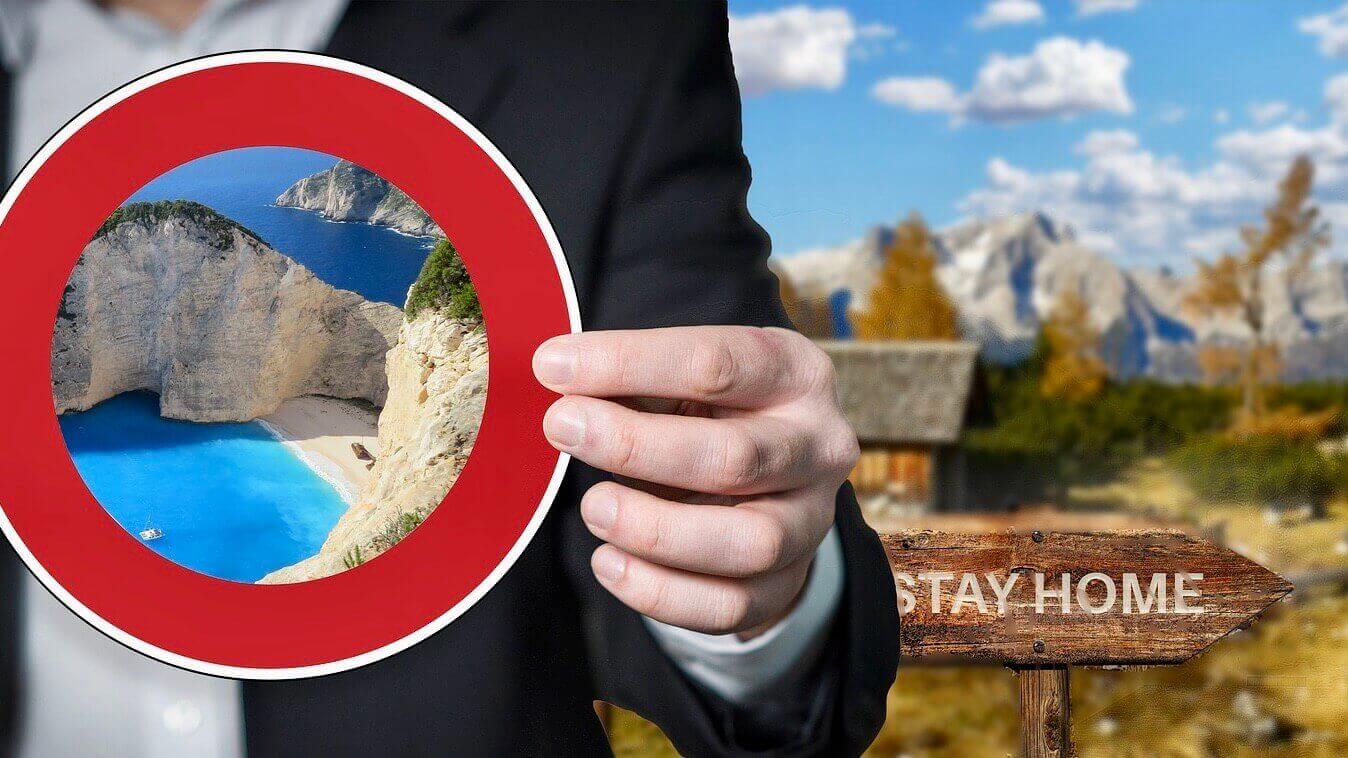
Covid and Travel Restrictions in South East Asia – Latest Updates at Beginning 2021
Travel restrictions are created and regularly updated by countries in the world because of coronavirus. Honestly, I lived nearly 30 years on this earth, but this is the first time I’ve ever seen a serious situation of movement around the globe. I canceled all my plans to travel internationally because it’s extremely hard to enter the countries now. Even, my visa exemptions to South East Asia countries do nothing.
Fortunately, I was able to travel around in my country, Vietnam, thanks to its great effort in defeating coronavirus. That supported my wanderlust a lot in looking for a chance to travel to other lands., at least in South East Asia.
I know there are people who got stuck in a country and want to find a way back home. Also, there are people who want to take a business trip to another country. Yes, for whatever reasons, there are still chances that you can come to another country, following its rules. Here in this list of travel restrictions in South East Asia countries, I hope you will find its info helpful for your chance to go to the place you desire, if possible.
According to Worldometers (updated Jan 8, 2021), South East Asia has about 1.630 million coronavirus cases with nearly 1.4 million people recovered. That’s such great news! Among them, Indonesia is leading the area with 808,340 cases. Alongside, some countries show really low numbers of positive Covid-19. I’m not sure if they do well in statistics and reports.
Anyway, with the latest development and launch of vaccines, countries are running to have them for their citizens so everything can return to normal. It’s awesome to see every country trying its best to fight the coronavirus!
Travel Restrictions by SEA Countries
Brunei
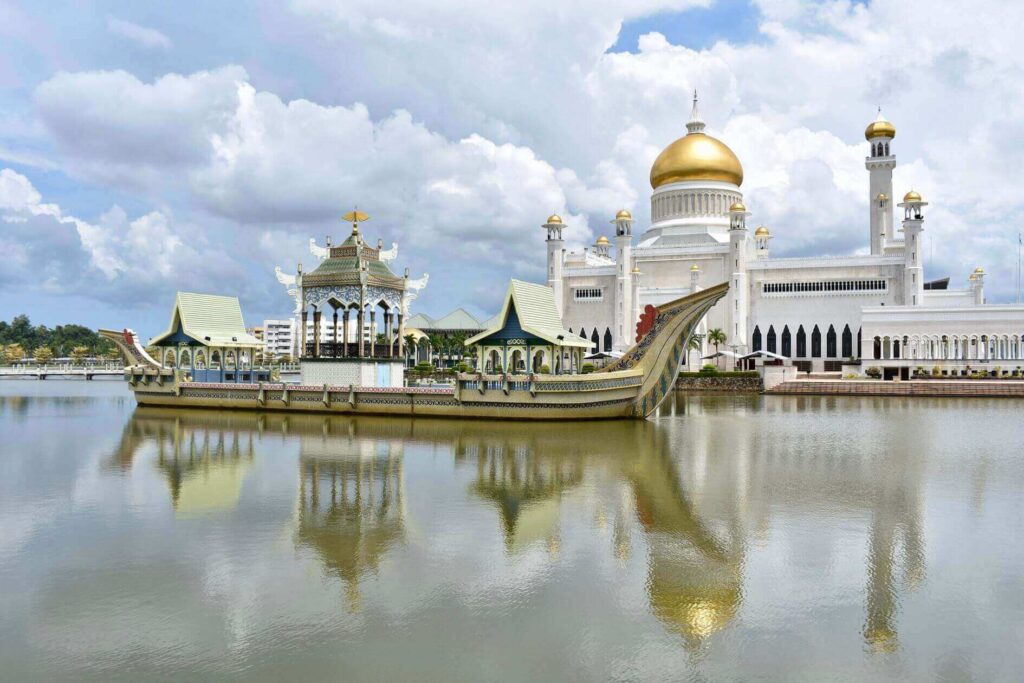
Most travelers will be restricted from entering the country, except for Brunei’s citizens and permanent residents. Some situations might be allowed for business purposes but they must undergo a case-by-case assessment.
Anyways, in order for a foreigner to travel to Brunei, you must have an agency or a family member of Brunei Darussalam submits a form on the Entry Travel Pass portal. Then, if you are permitted to travel to the country, there are documents you must prove:
- At least 14 days stayed in the country of departure.
- Passport with a valid visa.
- A valid air ticket for the flight itinerary.
- Proof of hotel reservation for at least 6 days from the day of arrival. The hotel is selected based on the list appointed for self-isolation purposes.
- A negative Covid-19 RT-PCR test result from a dedicated medical center.
- Possible payment for the Covid-19 RT-PCR test at post-arrival.
- Your smartphone with BruHealth app installed.
After arrival, you must go into isolation at the hotel booked. The length will be from 2 to 14 days depending on each case noticed before arrival.
For detailed info, you can read Brunei’s Entry Travel Pass Application Guideline.
Cambodia
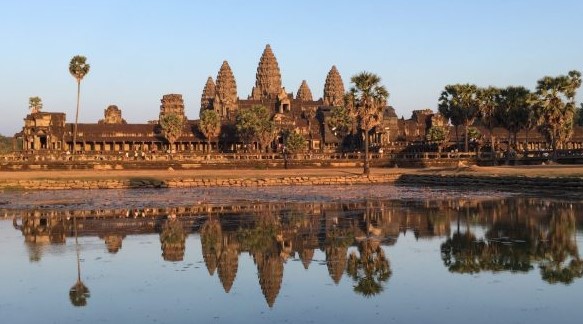
Travelers are almost unable to go to Cambodia at the moment. The country is running a suspension on all visa exemptions, visa on arrival, and e-visa. However, that doesn’t apply to the diplomatic visa (Visa A) and official visa (Visa B).
With a valid visa issued, there are things that you must prepare:
- Proof of negative COVID-19 PCR test results within 72 hours from the point of departure. The paper must be in English.
- Travel insurance with medical coverage of a minimum of USD $50,000. Definitely, travel insurance is the important one that you shouldn’t travel without it.
- Make a deposit of $2,000 upon arrival at a designated bank. The money will be used for any medical services that occur.
Post-arrival, passengers will be taken to a center for the Covid-19 test, and wait within 24 hours for the result. If there is nothing happens, you must do a self-quarantine at your accommodation in 14 days. There will be another test on the 13th day to make sure.
You can refer to Information on Cambodia Travel Restrictions for more details.
East Timor
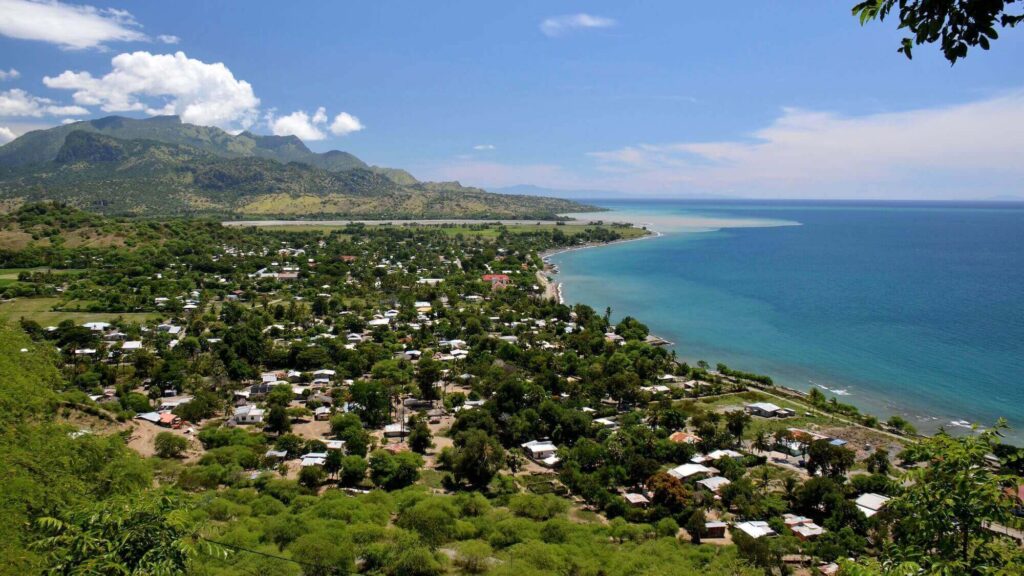
Timor-Leste has simple travel restrictions for anyone to follow. Overall, you cannot enter the country unless you are a country citizen or traveling for business purposes. And in case you are allowed, you need to provide a certificate of negative Covid-19 test result within 7 days from the place of departure.
Afterward, you must do a self-quarantine in 14 days at your accommodation or at one of the government’s facilities.
Just a note that East Timor has extended its closure of borders because of the emergency cases of coronavirus. The days of closure are considered to be lengthened depending on the situation.
Indonesia
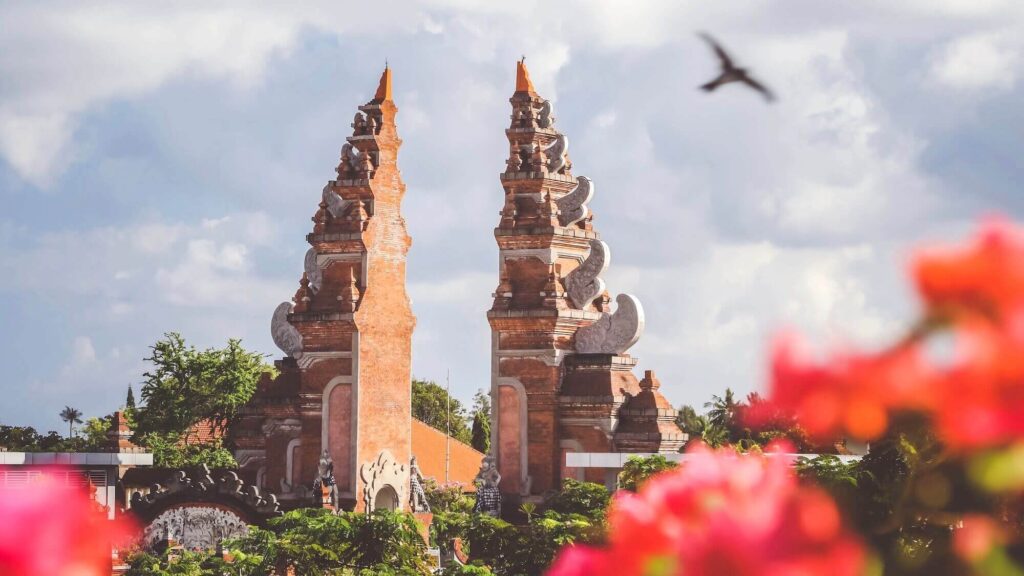
The suspension continues with most of the visas including the visa on arrival and visa exemptions. In other words, passengers aren’t allowed to enter Indonesia except those who have a Permanent/Temporary Stay Permit visa or diplomatic one.
There are things for the travelers if allowed, to present:
- A valid negative coronavirus test results in English within 48 hours since departure.
- An electronic Health Alert Card, which can be obtained from e-HAC’s website or app.
Then, Indonesian doctors will implement a COVID-19 test upon arrival and the traveler must go into a required 5-day quarantine.
Extra Info for Domestics Travel Destinations
As you may know, Indonesia has 34 provinces, and each one is undergoing its own rules to deal with coronavirus at the moment. If you are currently in Indonesia and plan to travel around, perhaps you want to check its closed tourism destinations before you go.
Laos
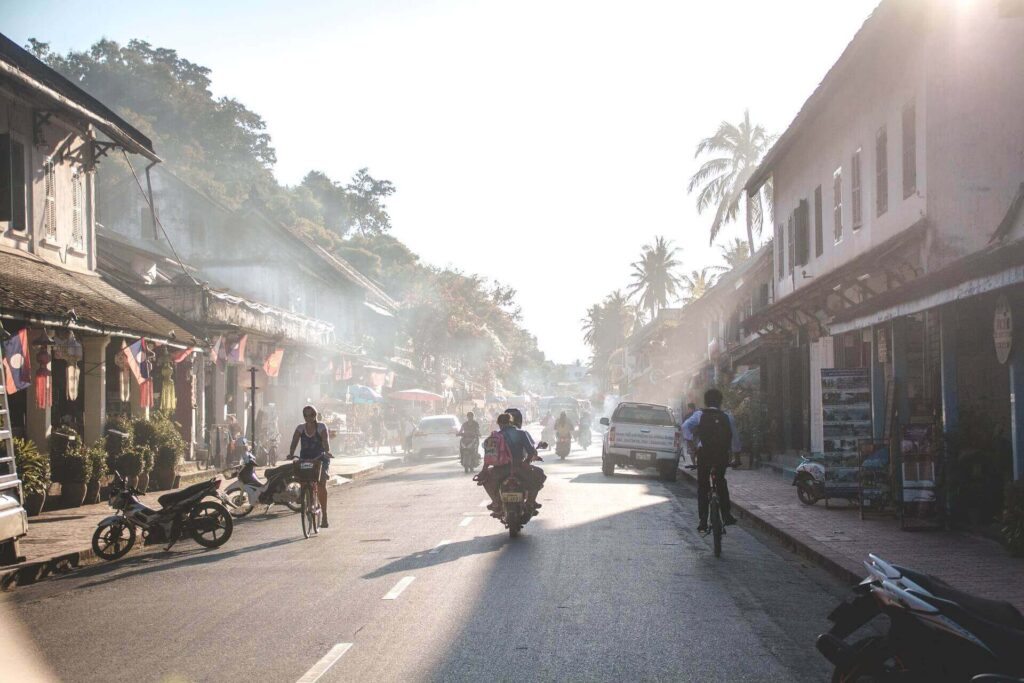
Laos is highly restrictive to travelers. Nevertheless, there are a few exemptions for diplomats, experts, technicians, or those who are in need of essential projects.
If they are granted entry permission, below are some requirements:
- A Certificate of Entry.
- A completed Declaration form.
- An issued Fit to Fly Certificate within 72 hours.
Afterward, a free Covid-19 test will be done on passengers on arrival. Those with the negative result then undergo quarantine in 14 days at appointed locations.
Good news to travelers who are currently inside Laos. The government of the country will extend current visas, or at least, they will try to be flexible in each case.
Malaysia
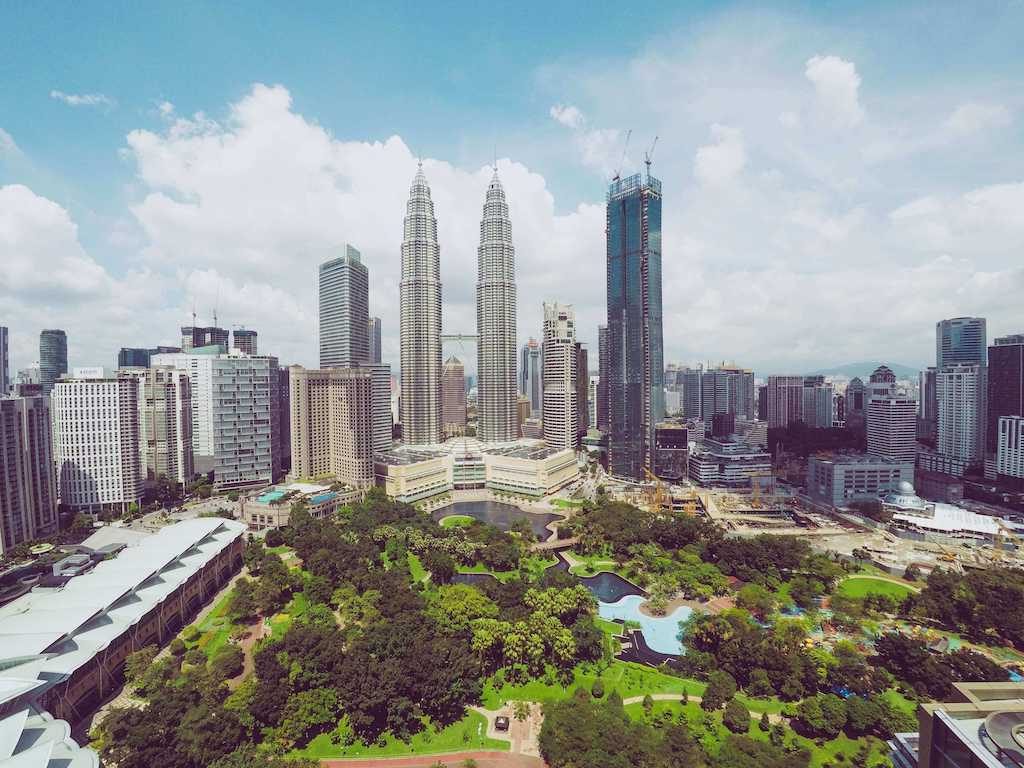
The country just extended the Recovery Movement Control Order (RMCO) to Mar 31, 2021. That means all foreign nationals aren’t allowed to enter the country. The list excludes employment passes, residences, professionals, and students. Moreover, those exemptions must better check for the approvals with authorities before their re-entry or departure. Additionally, New Zealand citizen is also on the exemption list but you should check again. Anyways, if you are on the list of people who can travel to Malaysia, you must submit an application on MY Travel Pass.
You then do an on-arrival screening for COVID-19 and 10 days of quarantine at one of the government’s facilities. Unfortunately, you must pay for all the costs that occurred during this period, including the accommodation fee. Also, you will need to download the MySejahtera app so the government can collect the data for safety reasons.
Myanmar (Burma)
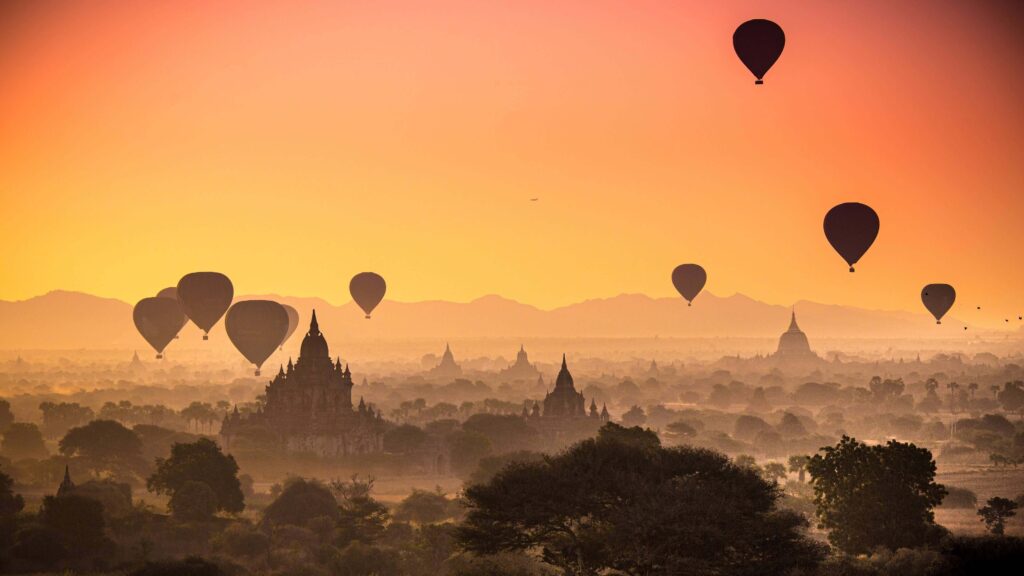
The country is implementing extreme travel restrictions. To elaborate, suspension to almost all flights to the country currently, especially those that come from the UK. Nonetheless, there are a few exceptions for people who travel for business purposes. But their cases are hardly assessed for permission at the Myanmar Embassy.
If allowed, travelers must provide a Certificate of negative coronavirus test results under 72 hours from departure place. Screening upon arrival is just a temperature check, but it may change. Afterward, you will be taken to one of the government’s facilities for 14 days of quarantine. And you must pay the cost of food.
Philippines
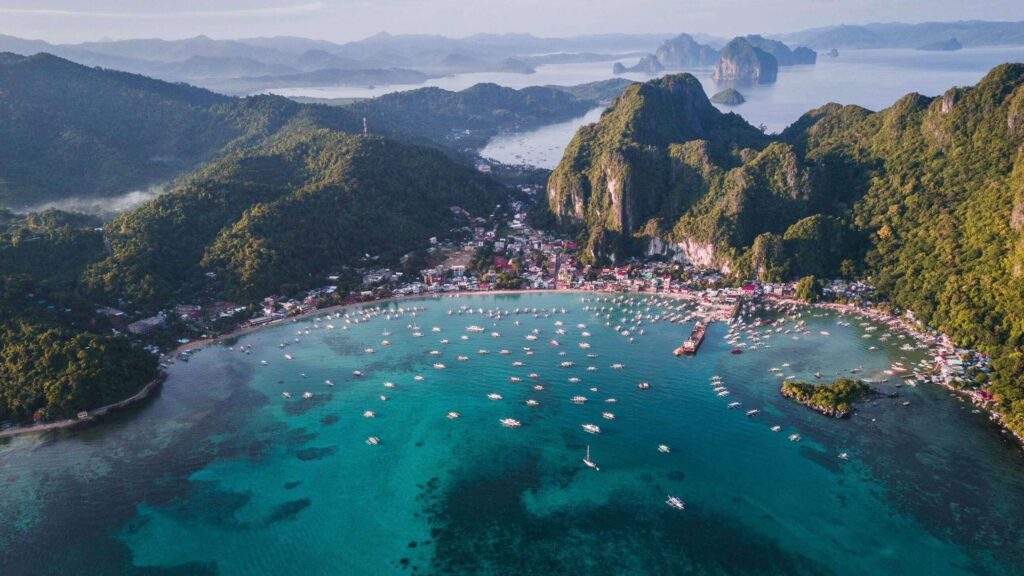
It seems like the Philippines has one of the most complicated travel restrictions in the area of SEA. Perhaps, I should find a way to summarize it.
Overall, the Philippines closed its new entry to most foreign travelers. Evenly, people with long-term visas must have permissions, following IATF conditions, in order to enter. Furthermore, there is a travel ban to a list of countries, including Africa, Australia, Canada, Denmark, France, Hong Kong, Germany, Italy, Israel, Ireland, Iceland, Japan, South, Switzerland, Spain, Singapore, Sweden, South Korea, the Netherlands, Lebanon, and the UK.
Actually, they do have exemptions for certain subjects. Those include relatives of the Philippines citizens and particular visas issued by special authorities. Anyways, if you are on the list of approval, there are things you must know:
- Having a hotel reservation at one of the accredited hotels by Tourism and Health Agencies. The hotel is for your 14-day self-isolation after arrival.
- Installing the TRAZE app on your device.
- Completing the “Case Investigation Form“.
- If you go to Davao (DVO), you must have evidence of negative COVID-19 test results within 72 hours from the departure spot.
- Going through a coronavirus test upon arrival.
Singapore
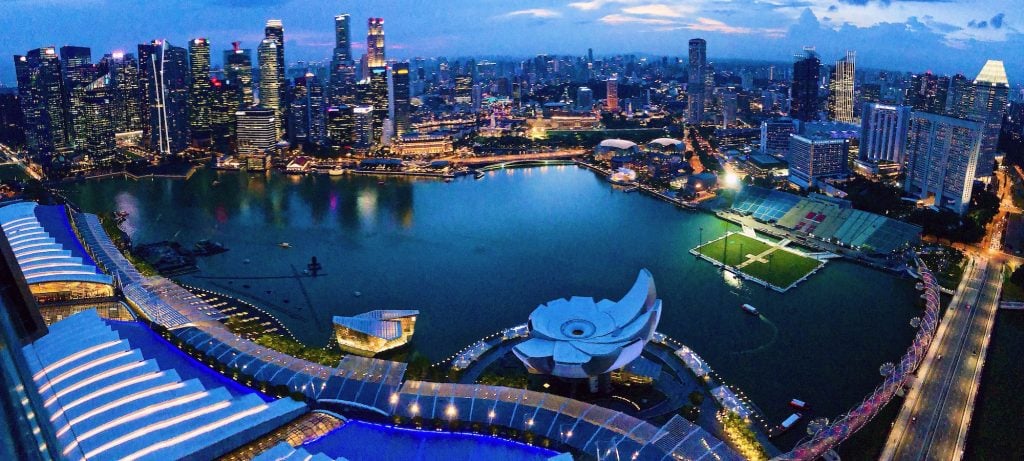
Singapore has very specific travel restrictions for different groups of passengers going to the country. Generally, the country mainly allows its nationals, permanent residents, and long-term visitors, especially those who come for business matters. Whereas, short-term ones are hard or unable to enter the country.
So, if you can go to the country, you must:
- Obtaining a PCR Covid-19 test with a negative result.
- Having a TraceTogether app installed on your mobile phone.
- Submitting an online health declaration before you land.
- Depending on the place of departure, you must have a SafeTravel Pass and proof of the return ticket.
Upon arrival, travelers must go on a Stay at Home Notice program for 14 days. You will go to one of the designated hotels and it costs $2000. Based on the country of departure, the length could be only 7 days. Before the program ends, you must take a COVID-19 test to make sure everything is ok.
Good News from Singapore
The country is going to be the first in Asia that have a vaccine for its citizens. As a result, there is a high chance that Singapore will open its border to travelers soon. Are you ready to travel to Singapore?
Thailand
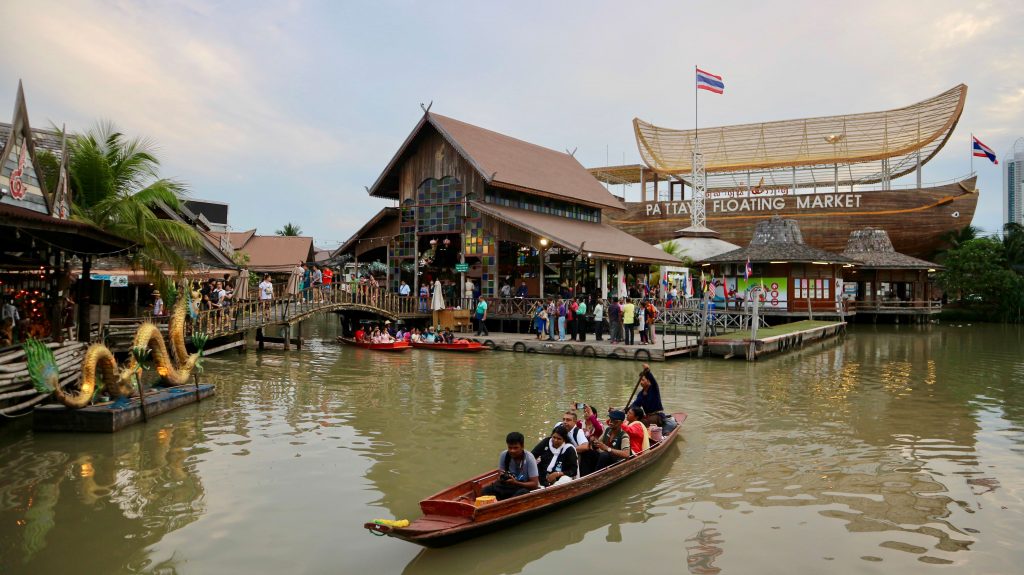
The tourism industry contributes a large part to the country’s GDP. Therefore, Thailand has opened its borders for traveling under some travel restrictions. To illustrate, the country allows nationals of Vietnam, Taiwan, Singapore, New Zealand, Malaysia, Korea, Hong Kong, Japan, China, and Australia with an APEC Business Travel Card to enter. In addition, some countries with visa exemptions are also able to travel to Thailand.
However, to truly put your steps into the country, there are certain requirements that you must have:
- Permission to travel applied via the Royal Thai Government.
- The medical certificate with a negative Coronavirus RT-PCR test result within 72 hours and in English.
- A Fit to Fly Certificate is issued within 72 hours. This one is similar to Laos.
- Travel insurance with medical coverage of a minimum of $100,000.
- Downloading the Thai Chana Covid-19 tracking app to your phone.
Travelers then go on 14 days at a State Quarantine of government. Further, COVID-19 tests will be done during the stays.
Vietnam
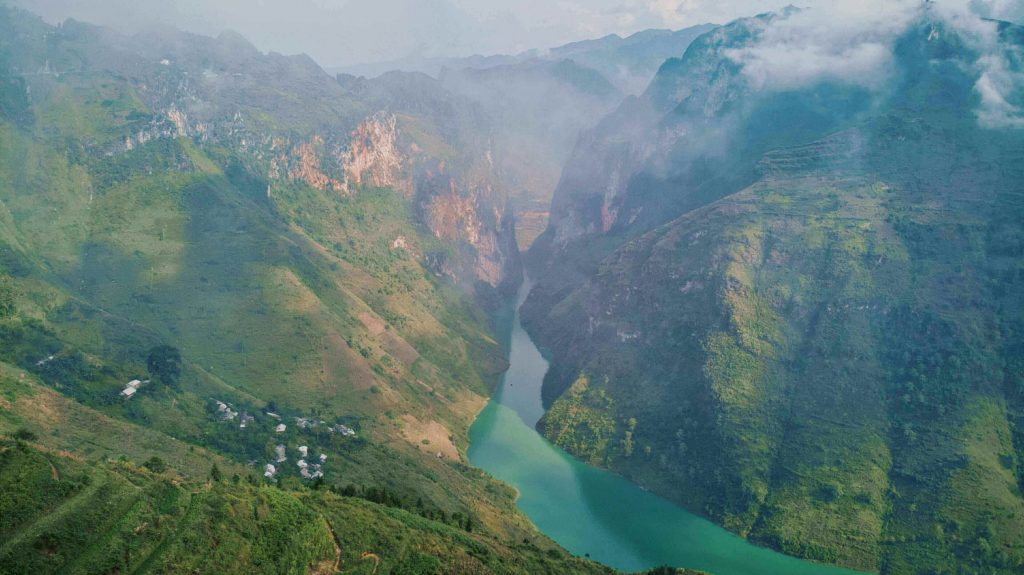
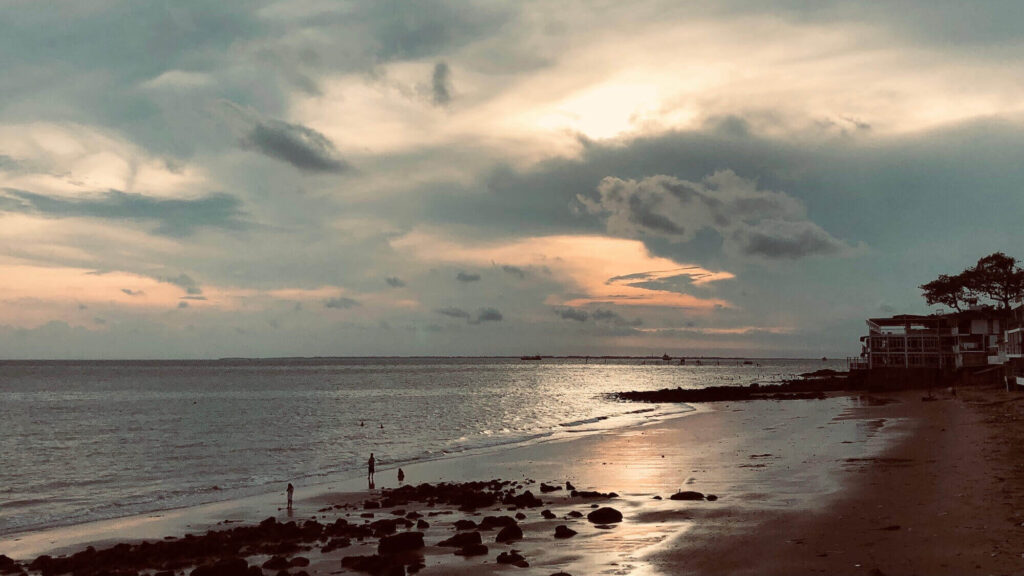
Vietnam has withstood waves of Covid-19 since the first time it appeared. At almost all times, the country took good actions to fight the virus and keep life running normally. Evenly, it’s ideal to travel around Vietnam during this coronavirus pandemic.
In order to keep the economy and society running, as usual, the country has limited commercial flights to carry the Vietnamese around the globe back home. Besides that, passengers who are high-tech workers, or travelers for business purposes can request permission to enter the country. Otherwise, visa exemptions and visas on arrival for most countries are suspended. Moreover, Vietnam opened its borders with China, Cambodia, and Laos to trade goods.
To the people who have a flight ticket, which means you are able to go to the country, there are things you must prepare:
- A Health Declaration Form which you can fill it online.
- A negative result of COVID-19 RT-PCR test within 3 – 7 days from the point of departure.
On arrival, you have to do a screening at the airport for a quick test. Then, you will be led to one of the government’s facilities or qualified hotels for isolation. The basic cost of the medical services is already counted on your flight ticket. You are just subject to anything extra.
References
- IATA Travel Center, COVID-19 Travel Regulations Map, updated Jan 06, 2021.
- Travelbans, Asia Travel Restrictions, Asia, 2021.
- Worldometer, Covid-19 Coronavirus Pandemic, last updated Jan 08, 2021.
SAVE THE VITAL INFO OF TRAVEL RESTRICTIONS IN SEA, PIN NOW!
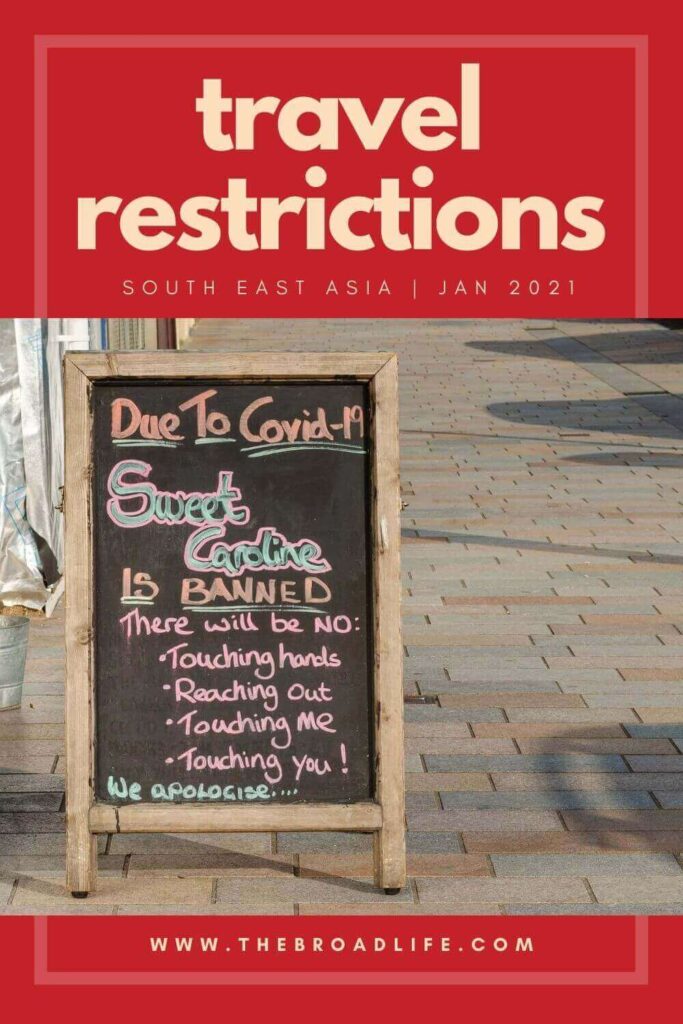

14 Comments
-
-
Steven Morrissette
That is great info about coronavirus restrictions in those Asian countries. But I will wait a bit before travelling again just in case.
-
Marysa
It is good to be as well informed as possible when it comes to traveling. Coronavirus definitely complicates things. This has been a frustrating time and it is important to make sure things go smoothly.
-
emman damian
Thank you for the in-depth analysis on the travel restrictions in SE Asia! I’ll definitely bookmark this. I hope it will be updated fortnightly too as some countries have updates. Thank you!
-
Super Busy Mum
I cannot imagine {or fathom} why people are travelling during this whole…situation. But I do understand some people have too. So this is such an important email, thanks for sharing.
-
yudith napitupulu
Well-informed. This is really important for traveler who want visit Asia. So will be careful with the situation.
-


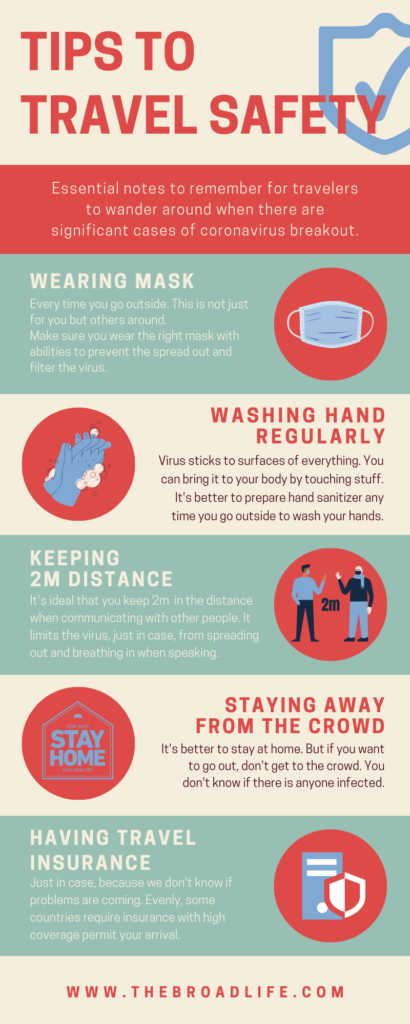

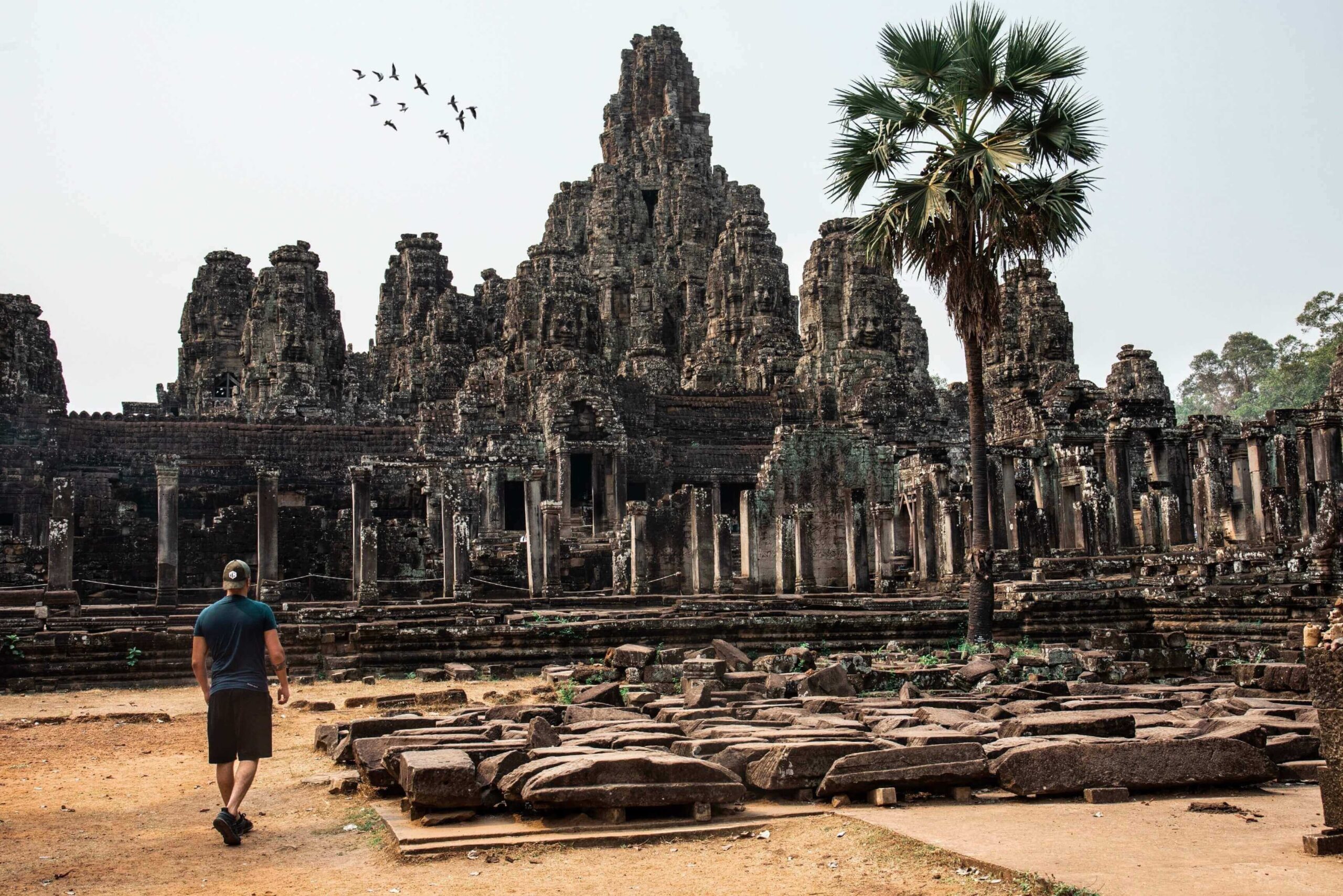



Cristina Petrini
Absolutely important because those who can travel and want to travel in these countries, how nice when all these problems are gone!